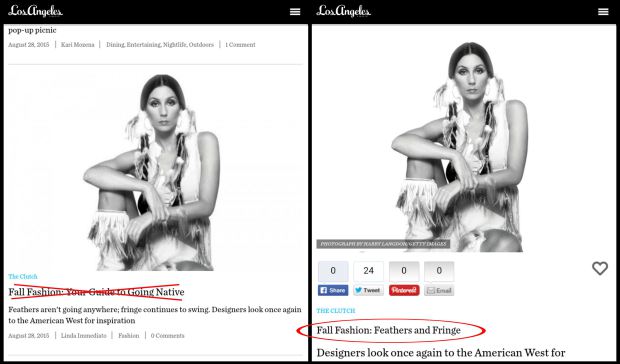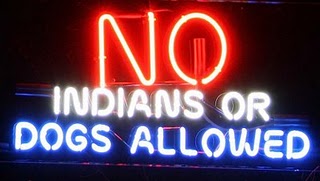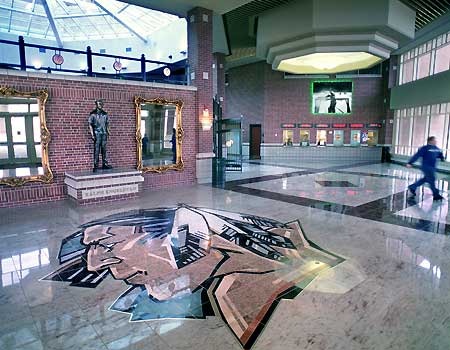The Unraceable 'Kimmy Schmidt': Does Tina Fey's New Show Have a Race Problem?
With Jane Krakowski playing Native American and an Asian character right out of "Sixteen Candles," "Unbreakable Kimmy Schmidt" is almost begging to be labeled "problematic." Is that so bad?
By Sam AdamsTiny Fey isn't a creator you naturally associate with provocation—a Shonda Rhimes, a Lena Dunham, heck, a Lars Von Trier. But "Unbreakable Kimmy Schmidt," the 13-episode series she created with Robert Carlock for Netflix, has been slapped with a scarlet P for "problematic," especially for its treatment of race.
On Vulture, Libby Hill took issue with the "Kimmy Schmidt" subplot involving Jane Krakowski's Jacqueline, a stressed-out Manhattan trophy wife who it's eventually revealed is Lakota, a refugee from a Native American reservation who's been passing for white for decades. Jacqueline's parents are played by Native actors Gil Birmingham and Sheri Foster and, within the context of "Kimmy's" generally farcical tone, the show works to ground the character in something resembling respect for Lakota culture. But for Vulture's Libby Hill, that doesn't offset an initial decision that seems arbitrary and ill thought-out:
Carlock positions the decision as a narrative choice. But this specific backstory is most frustrating because it doesn’t serve a purpose, either narratively or comedically. There must be more compelling (and funnier!) ways to give Jacqueline a backstory that don’t require sloppily marginalizing a group of people who are already as marginalized as you can get. It’s especially disappointing because "Unbreakable Kimmy Schmidt" so deftly integrates race in other instances, mainly in the latter half of its first season. The most prominent example comes when Kimmy’s African-American roommate, Titus, gets a job that requires him to dress as a werewolf. The punch line: He discovers he gets better treatment from strangers while in a monster costume than he does as a black man. The point is sharp, and it works largely because Titus is the one pointing out the discrepancies. This is precisely what isn’t happening when it comes to the dynamic between Jackie Lynn and her parents.
In the Washington Post, Alyssa Rosenberg countered that the show is careful to make sure the joke is always about Jacqueline's own discomfort, and the contempt for her Native American she's internalized from the culture at large: She changed her name from Jackie Lynn, she explains, because it's "a cheap stripper name. Jacqueline is an expensive stripper name."
Going beyond Jacqueline, a BuzzFeed roundtable between Anne Helen Petersen, Ira Madison III and Alex Alvarez concluded that "Kimmy Schmidt" has "a major race problem." On the one hand, Madison says, "Kimmy Schmidt" has already developed Titus Andromedon (Tituss Burgess), Kimmy's gay, black roommate, more in one season than "30 Rock" developed Tracy Jordan in six. But at the same time, there's "Kimmy's" Dong (Ki Hong Lee), a Vietnamese immigrant who seems like a deliberate callback to "Sixteen Candles'" notoriously racist caricature, Long Duk Dong.
IM3: I know next to nothing about the intricacies of Native American culture and even I was like, um, this doesn’t seem…right? And just like Dong, it was a bunch of jokes that we’ve heard before but said in a winking, “isn’t it funny, we get it’s racist!” kinda way. Like, OK, cool. But in the real world, if a white person says those things to me, it’s a microaggression and I’m most certainly not here for that. So why is it OK when the white person puts those words into an actor’s mouth and just has them say it on TV? What’s the difference?
AA: Right. I hate couching racism under the term “hipster racism,” because, like, it’s the same thing. You’re saying the same thing. The result is the same. It’s racism whether or not you “mean” to be racist.Rob's review
My initial take while watching the show:
Watching
Unbreakable Kimmy Schmidt (no relation). Waiting for the jokes to kick in after the first 15 minutes.
I guess the first episode is mostly setup. The humor must start in the second episode.
I hope the Hispanic maid reappears. Since the idea that she'd go to the cult leader for a job interview and stay voluntarily for 15 years, without even learning English, is flatly racist.
So Kimmie supposedly went underground at age 13 or so for 15 years? Y'know, 13-year-olds actually know a fair amount about the world already. Like you don't take a backpack with $13,000 to a dance club. Candy stores sell unlimited amounts of candy that you can eat for dinner if you wish. Horse-drawn carriages aren't some weird form of horse enslavement. Etc.
Maybe this hyper-naivete was funny the first time I saw it on
The Beverly Hillbillies 50 years ago. Although that was never the funniest show either. But I'm not feeling it as a source of humor in 2015.
After the first three episodes...I didn't find the show at all funny. Most of the characters are caricatures, starting with the naive and optimistic Kimmy the repeated-rape victim. The gay black roommate loves Broadway shows and
The Lion King. The old people--the landlady and Kimmy's first "date"--are a cat lady and a senile old coot, respectively. Jacqueline and her daughter are spoiled rich white people personified--even though Jacqueline is supposedly Native.
Then there are the minor characters. Besides the Latina maid and the Indians, there are the Hispanic performers dressed as a mariachi band. And the Korean mourners at a funeral. They're not strange, exactly, since they don't say anything. But they let Titus, a complete stranger, sing in their midst. They seem to be stereotypical Asians who'll passively let someone take over their ceremony because they don't know what's going on.
Hip to be racist
I gather
Kimmy Schmidt's racial portrayals get better later on. But if it takes you six or seven episodes to get race reasonably right, I'd say you've failed.
"Hipster racism" seems like the right label for what's going on. I can imagine the writers saying, "We're not laughing at the stereotypical maid who can't speak English. We're presenting her so you can laugh at the ignorant people who would laugh at her."
Or, "We're not laughing at Indians who think planes are 'iron eagles.' We're laughing at the ignorant people who think Indians think planes are iron eagles. Even thought we don't show any of these ignorant people, much less laugh at them."
It's like
Kimmy is trying to have it both ways. Which is evident in the Korean character named Dong. "His name is funny...ha ha! But we understand it's funny, so we're not laughing at him. We're laughing at
you if you think his name is funny. You're the ignorant one in that case, not us."
This is a good example of hipster racism: presenting racism, then winking at it. And acting as if that's enough to excuse the racism. No, it isn't.
I'd say the Native subplot is a particular case of failure. In the first three episodes, Jacqueline doesn't show one iota of being torn between her Native and white identities. She's a white woman in her white world and even with her Native parents. That she has a Native upbringing is a gimmick, not a genuine character trait. It does nothing to distinguish her from millions of rich white women who look and act like her.
So she's Native because that's a "hip" way to make her more "complex." Look, she has a backstory! Even though it's little more than a few buzzwords: reservation, buffalo, eagle, etc. It's a
Saturday Night Live version of race, which makes sense given Fey's background. And it's about as unsatisfying.
For more on
Unbreakable Kimmy Schmidt, see
Racial Stereotypes in Unbreakable Kimmy Schmidt and
Unbreakable Kimmy Schmidt Just a Comedy?





















